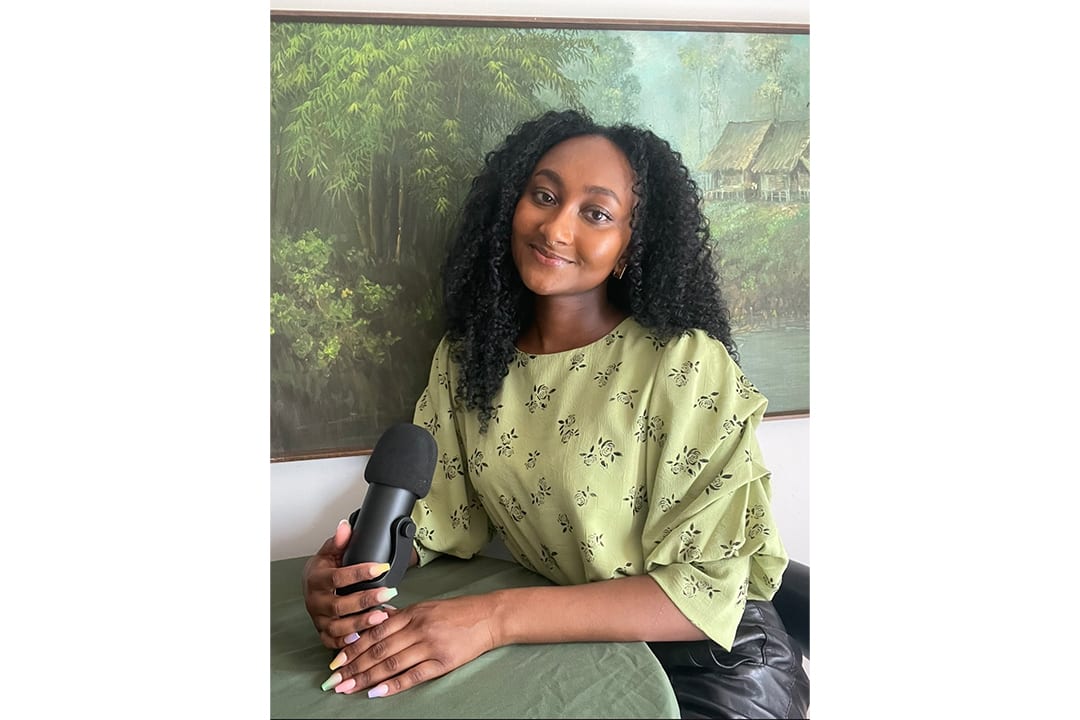Recent UTSC graduate Serena Bahadur is the host for season two of Diverse Economy Conversations for Youth, a podcast that features interviews with academics and leaders within the field of feminist political economies — a field that, broadly, investigates how economic systems depend on and reinforce inequalities. The podcast aims to tackle systemic and racist barriers present in the economy and show young listeners that alternative economic futures are possible.
The podcast gets its funding from the Canada Research Chairs in Africana Development and Feminist Political Economy, and is one of several projects from U of T professor Caroline Shenaz Hossein’s Diverse Solidarity Economies (DISE) Collective, which she founded in 2017 with the goal of “decolonizing and diversifying the field of political economy.” DISE Collective members are anti-racist feminists working on community and academic projects in hopes of combatting social and corporate exclusion.
Bahadur’s journey
Bahadur, a 2023 international development studies graduate from UTSC, in an interview with The Varsity talked about how she got the position: “Man, I don’t know. Sometimes I ask myself the same question.” She recounted that she initially contacted Hossein, who is an associate professor at UTSC for global development and cross-appointed to U of T’s graduate program of political science, to simply work as a research assistant. Then, one day, she found she had become not only a research assistant but also a podcast host.
Hosting the podcast, Bahadur said, is a way for her to “use [her] voice for these ideas that we can all definitely stand to hear.” In particular, she highlighted her interest in the relationships between race and social institutions, and how younger generations can take part in moulding the world into a better place.
In each episode, Bahadur typically interviews a DISE Collective member to get their insights on political economies. In these conversations, the aim is to provide the young audience with insight into the diversity of economic systems. These conversations “teach people about the different ways we can run the economy, instead of having the economy run us,” Bahadur said.
Behind the scenes of an episode
As the host, Bahadur is in charge of preparing each podcast episode’s topic. The subject of a podcast episode greatly depends on which DISE Collective member is set to be interviewed. Once the episode’s guest has been confirmed, she said that she asks herself, “What about this is the most important for our future? What tangible solution could this be a part of?”
Through the podcast, Bahadur explores economic systems alongside the audience that provide alternatives to standard models of capitalism, which include solidarity economies, social economies, and Black social economies. Such alternative systems might revolve around satisfying common needs, rather than making a return on capital.
“They support global communities quietly, but fundamentally, in ways that capitalism can’t,” Bahadur explained. “They’re rooted in those values of reciprocity and trust. It’s like a whole different take on how to run an economy together instead of grinding all on our own just for pennies and for status.”
Bahadur emphasized that the podcast allowed her to become more optimistic about the future of the world. “The world can be anything… no one said that it would be easy, but I think whatever you believe in is always what is worth fighting for,” she said.
“If you’re someone who has ever worried or just wondered about the direction that our future is headed in, I would just say: take a listen and see how you feel.”
The podcast is currently available to listeners on its website and on Apple Podcasts.



No comments to display.